|
User talk:Hmich176
Guidelines (PLEASE READ!)
WikiProject X Newsletter • Issue 10This month, we discuss the new CollaborationKit extension. Here's an image as a teaser: 23:59, 3 March 2017 (UTC) Books and Bytes - Issue 21Books & Bytes
Sent by MediaWiki message delivery (talk) 22:54, 6 April 2017 (UTC) Editing News #1—2017Read this in another language • Subscription list for this multilingual newsletter  Did you know that you can review your changes visually?  In visual mode, you will see additions, removals, new links, and formatting highlighted. Other changes, such as changing the size of an image, are described in notes on the side. Click the toggle button to switch between visual and wikitext diffs. 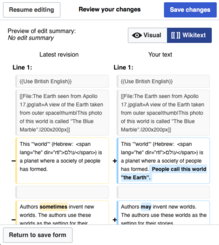 The wikitext diff is the same diff tool that is used in the wikitext editors and in the page history. You can read and help translate the user guide, which has more information about how to use the visual editor. Since the last newsletter, the VisualEditor Team has spent most of their time supporting the 2017 wikitext editor mode which is available inside the visual editor as a Beta Feature, and adding the new visual diff tool. Their workboard is available in Phabricator. You can find links to the work finished each week at mw:VisualEditor/Weekly triage meetings. Their current priorities are fixing bugs, supporting the 2017 wikitext editor as a beta feature, and improving the visual diff tool. Recent changesA new wikitext editing mode is available as a Beta Feature on desktop devices. The 2017 wikitext editor has the same toolbar as the visual editor and can use the citoid service and other modern tools. Go to Special:Preferences#mw-prefsection-betafeatures to enable the ⧼Visualeditor-preference-newwikitexteditor-label⧽. A new visual diff tool is available in VisualEditor's visual mode. You can toggle between wikitext and visual diffs. More features will be added to this later. In the future, this tool may be integrated into other MediaWiki components. [1] The team have added multi-column support for lists of footnotes. The Other changes:
Future changes
If you aren't reading this in your preferred language, then please help us with translations! Subscribe to the Translators mailing list or contact us directly, so that we can notify you when the next issue is ready. Thank you! User:Whatamidoing (WMF) (talk) 19:18, 9 May 2017 (UTC) Books and Bytes - Issue 22Books & Bytes
Sent by MediaWiki message delivery on behalf of The Wikipedia Library team --MediaWiki message delivery (talk) 18:35, 20 June 2017 (UTC) Books and Bytes - Issue 23Books & Bytes
Chinese, Arabic and Yoruba versions of Books & Bytes are now available in meta! Sent by MediaWiki message delivery on behalf of The Wikipedia Library team --MediaWiki message delivery (talk) 02:04, 23 August 2017 (UTC) Books and Bytes - Issue 24Books & Bytes
Arabic, Kiswahili and Yoruba versions of Books & Bytes are now available in meta! Sent by MediaWiki message delivery on behalf of The Wikipedia Library team --MediaWiki message delivery (talk) 04:53, 21 October 2017 (UTC) Hi. We're into the last five days of the Women in Red World Contest. There's a new bonus prize of $200 worth of books of your choice to win for creating the most new women biographies between 0:00 on the 26th and 23:59 on 30th November. If you've been contributing to the contest, thank you for your support, we've produced over 2000 articles. If you haven't contributed yet, we would appreciate you taking the time to add entries to our articles achievements list by the end of the month. Thank you, and if participating, good luck with the finale! ArbCom 2017 election voter messageHello, Hmich176. Voting in the 2017 Arbitration Committee elections is now open until 23.59 on Sunday, 10 December. All users who registered an account before Saturday, 28 October 2017, made at least 150 mainspace edits before Wednesday, 1 November 2017 and are not currently blocked are eligible to vote. Users with alternate accounts may only vote once. The Arbitration Committee is the panel of editors responsible for conducting the Wikipedia arbitration process. It has the authority to impose binding solutions to disputes between editors, primarily for serious conduct disputes the community has been unable to resolve. This includes the authority to impose site bans, topic bans, editing restrictions, and other measures needed to maintain our editing environment. The arbitration policy describes the Committee's roles and responsibilities in greater detail. If you wish to participate in the 2017 election, please review the candidates and submit your choices on the voting page. MediaWiki message delivery (talk) 18:42, 3 December 2017 (UTC) Books and Bytes - Issue 25Books & Bytes
Arabic, Korean and French versions of Books & Bytes are now available in meta! Sent by MediaWiki message delivery on behalf of The Wikipedia Library team --MediaWiki message delivery (talk) 18:57, 15 December 2017 (UTC) Books and Bytes - Issue 26Books & Bytes
Arabic and French versions of Books & Bytes are now available in meta! Sent by MediaWiki message delivery on behalf of The Wikipedia Library team --MediaWiki message delivery (talk) 17:36, 31 January 2018 (UTC) WikiProject X Newsletter • Issue 11Newsletter • February 2018
Check out this month's issue of the WikiProject X newsletter, with plans to renew work with a followup grant proposal to support finalising the deployment of CollaborationKit! -— Isarra ༆ 21:26, 14 February 2018 (UTC) Editing News #1—2018Read this in another language • Subscription list for the English Wikipedia • Subscription list for the multilingual edition  Did you know that you can now use the visual diff tool on any page?  Sometimes, it is hard to see important changes in a wikitext diff. This screenshot of a wikitext diff (click to enlarge) shows that the paragraphs have been rearranged, but it does not highlight the removal of a word or the addition of a new sentence. If you enable the Beta Feature for "⧼visualeditor-preference-visualdiffpage-label⧽", you will have a new option. It will give you a new box at the top of every diff page. This box will let you choose either diff system on any edit. Click the toggle button to switch between visual and wikitext diffs. In the visual diff, additions, removals, new links, and formatting changes will be highlighted. Other changes, such as changing the size of an image, are described in notes on the side. 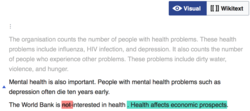 This screenshot shows the same edit as the wikitext diff. The visual diff highlights the removal of one word and the addition of a new sentence. An arrow indicates that the paragraph changed location. You can read and help translate the user guide, which has more information about how to use the visual editor. Since the last newsletter, the Editing Team has spent most of their time supporting the 2017 wikitext editor mode, which is available inside the visual editor as a Beta Feature, and improving the visual diff tool. Their work board is available in Phabricator. You can find links to the work finished each week at mw:VisualEditor/Weekly triage meetings. Their current priorities are fixing bugs, supporting the 2017 wikitext editor, and improving the visual diff tool. Recent changes
Let's work together
—User:Whatamidoing (WMF) (talk) 23:14, 28 February 2018 (UTC) Select Survey InviteI'm working on a study of political motivations and how they affect editing. I'd like to ask you to take a survey. The survey should take no more than 1-2 minutes. Your survey responses will be kept private. Our project is documented at https://meta.wikimedia.org/wiki/Research:Wikipedia_%2B_Politics. Your survey Link: http://uchicago.co1.qualtrics.com/jfe/form/SV_9S3JByWf57fXEkR?Q_DL=56np5HpEZWkMlr7_9S3JByWf57fXEkR_MLRP_eJ5AdLF3keiIGDb&Q_CHL=gl I am asking you to participate in this study because you are a frequent editor of pages on Wikipedia that are of political interest. We would like to learn about your experiences in dealing with editors of different political orientations. Sincere thanks for your help! Porteclefs (talk) 01:13, 12 April 2018 (UTC) Books & Bytes - Issue 27Books & Bytes
Arabic, Chinese and French versions of Books & Bytes are now available in meta! Sent by MediaWiki message delivery on behalf of The Wikipedia Library team --MediaWiki message delivery (talk) 14:50, 18 April 2018 (UTC) Books & Bytes – Issue 28Books & Bytes
Arabic, Chinese, Hindi, Italian and French versions of Books & Bytes are now available in meta! Sent by MediaWiki message delivery on behalf of The Wikipedia Library team --MediaWiki message delivery (talk) 19:33, 20 June 2018 (UTC) Books & Bytes – Issue 29Books & Bytes
Hindi, Italian and French versions of Books & Bytes are now available in meta! Sent by MediaWiki message delivery on behalf of The Wikipedia Library team --MediaWiki message delivery (talk) 16:02, 25 August 2018 (UTC) WikiProject X Newsletter • Issue 12Newsletter • August 2018
This month: WikiProject X: The resumption Work has resumed on WikiProject X and CollaborationKit, backed by a successfully funded Project Grant. For more information on the current status and planned work, please see this month's issue of the newsletter! -— Isarra ༆ 22:24, 30 August 2018 (UTC) Books & Bytes, Issue 30Books & Bytes
French version of Books & Bytes is now available in meta! Sent by MediaWiki message delivery on behalf of The Wikipedia Library team --MediaWiki message delivery (talk) 03:43, 25 October 2018 (UTC) Editing News #2—2018Read this in another language • Subscription list for this multilingual newsletter • Subscription list on the English Wikipedia  Did you know? Did you know that you can use the visual editor on a mobile device? 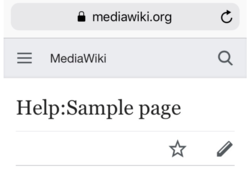 Tap on the pencil icon to start editing. The page will probably open in the wikitext editor. You will see another pencil icon in the toolbar. Tap on that pencil icon to the switch between visual editing and wikitext editing.  Remember to publish your changes when you're done. You can read and help translate the user guide, which has more information about how to use the visual editor. Since the last newsletter, the Editing Team has wrapped up most of their work on the 2017 wikitext editor and the visual diff tool. The team has begun investigating the needs of editors who use mobile devices. Their work board is available in Phabricator. Their current priorities are fixing bugs and improving mobile editing. Recent changes
Let's work together
— Whatamidoing (WMF) (talk) 17:11, 1 November 2018 (UTC) ArbCom 2018 election voter messageHello, Hmich176. Voting in the 2018 Arbitration Committee elections is now open until 23.59 on Sunday, 3 December. All users who registered an account before Sunday, 28 October 2018, made at least 150 mainspace edits before Thursday, 1 November 2018 and are not currently blocked are eligible to vote. Users with alternate accounts may only vote once. The Arbitration Committee is the panel of editors responsible for conducting the Wikipedia arbitration process. It has the authority to impose binding solutions to disputes between editors, primarily for serious conduct disputes the community has been unable to resolve. This includes the authority to impose site bans, topic bans, editing restrictions, and other measures needed to maintain our editing environment. The arbitration policy describes the Committee's roles and responsibilities in greater detail. If you wish to participate in the 2018 election, please review the candidates and submit your choices on the voting page. MediaWiki message delivery (talk) 18:42, 19 November 2018 (UTC) List of Duck Quacks Don't Echo episodes moved to draftspaceAn article you recently created, List of Duck Quacks Don't Echo episodes, does not have enough sources and citations as written to remain published. It needs more citations from reliable, independent sources. (?) Information that can't be referenced should be removed (verifiability is of central importance on Wikipedia). I've moved your draft to draftspace (with a prefix of " WikiProject X Newsletter • Issue 13Newsletter • December 2018
This month: A general update. The current status of the project is as follows:
Until next time, -— Isarra ༆ 22:44, 20 December 2018 (UTC) Books & Bytes, Issue 31Books & Bytes
French version of Books & Bytes is now available on meta! Sent by MediaWiki message delivery on behalf of The Wikipedia Library team --MediaWiki message delivery (talk) 14:34, 21 December 2018 (UTC) Books & Bytes, Issue 32Books & Bytes
French version of Books & Bytes is now available on meta! Sent by MediaWiki message delivery on behalf of The Wikipedia Library team --MediaWiki message delivery (talk) 03:29, 26 February 2019 (UTC) Wiki\ listed at Redirects for discussionAn editor has asked for a discussion to address the redirect Wiki\. Since you had some involvement with the Wiki\ redirect, you might want to participate in the redirect discussion if you wish to do so. Goveganplease (talk) 00:56, 19 March 2019 (UTC) Books & Bytes, Issue 33Books & Bytes
Sent by MediaWiki message delivery on behalf of The Wikipedia Library team --MediaWiki message delivery (talk) 06:41, 21 May 2019 (UTC) Your draft article, Draft:List of Duck Quacks Don't Echo episodesHello, Hmich176. It has been over six months since you last edited the Articles for Creation submission or Draft page you started, "List of Duck Quacks Don't Echo episodes". In accordance with our policy that Wikipedia is not for the indefinite hosting of material deemed unsuitable for the encyclopedia mainspace, the draft has been nominated for deletion. If you plan on working on it further, or editing it to address the issues raised if it was declined, simply and remove the If your submission has already been deleted by the time you get there, and you wish to retrieve it, you can request its undeletion by following the instructions at this link. An administrator will, in most cases, restore the submission so you can continue to work on it. Thanks for your submission to Wikipedia, and happy editing. JMHamo (talk) 08:21, 24 May 2019 (UTC) WikiProject X Newsletter • Issue 14Newsletter • June 2019
Updates: I've been focusing largely on the development side of things, so we are a lot closer now to being ready to actually start discussing deploying it and testing it out here. There's just a few things left that need to be resolved:
Some other stuff that's happened in the meantime:
Until next time, -— Isarra ༆ 21:43, 21 June 2019 (UTC) Books & Bytes Issue 34, May – June 2019Books & Bytes
French version of Books & Bytes is now available on meta! Sent by MediaWiki message delivery on behalf of The Wikipedia Library team --MediaWiki message delivery (talk) 14:20, 12 July 2019 (UTC) Editing News #1—July 2019Read this in another language • Subscription list for this multilingual newsletter  Did you know? Did you know that you can use the visual editor on a mobile device? Every article has a pencil icon at the top. Tap on the pencil icon Edit Cards 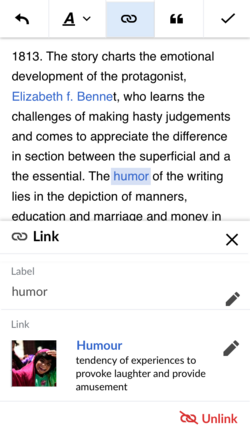 This is what the new Edit Cards for editing links in the mobile visual editor look like. You can try the prototype here: 📲 Try Edit Cards. Welcome back to the Editing newsletter. Since the last newsletter, the team has released two new features for the mobile visual editor and has started developing three more. All of this work is part of the team's goal to make editing on mobile web simpler. Before talking about the team's recent releases, we have a question for you: Are you willing to try a new way to add and change links? If you are interested, we would value your input! You can try this new link tool in the mobile visual editor on a separate wiki. Follow these instructions and share your experience: Recent releasesThe mobile visual editor is a simpler editing tool, for smartphones and tablets using the mobile site. The Editing team has recently launched two new features to improve the mobile visual editor:
Section editing and the new loading overlay are now available to everyone using the mobile visual editor. New and active projectsThis is a list of our most active projects. Watch these pages to learn about project updates and to share your input on new designs, prototypes and research findings.
Looking ahead
Learning moreThe VisualEditor on mobile is a good place to learn more about the projects we are working on. The team wants to talk with you about anything related to editing. If you have something to say or ask, please leave a message at Talk:VisualEditor on mobile. PPelberg (WMF) (talk) and Whatamidoing (WMF) (talk) 21:25, 15 July 2019 (UTC) 38th edition of The Hurricane Herald
Books & Bytes – Issue 35, July – August 2019Books & Bytes
On behalf of The Wikipedia Library team --MediaWiki message delivery (talk) 06:58, 27 September 2019 (UTC) WikiProject X Newsletter • Issue 15Newsletter • September 2019
A final update, for now:
Regards, -— Isarra ༆ 19:24, 29 September 2019 (UTC) Editing News #2 – Mobile editing and talk pages – October 2019Read this in another language • Subscription list for this multilingual newsletter Inside this newsletter, the Editing team talks about their work on the mobile visual editor, on the new talk pages project, and at Wikimania 2019. HelpWhat talk page interactions do you remember? Is it a story about how someone helped you to learn something new? Is it a story about how someone helped you get involved in a group? Something else? Whatever your story is, we want to hear it! Please tell us a story about how you used a talk page. Please share a link to a memorable discussion, or describe it on the talk page for this project. The team would value your examples. These examples will help everyone develop a shared understanding of what this project should support and encourage. Talk PagesThe Talk Pages Consultation was a global consultation to define better tools for wiki communication. From February through June 2019, more than 500 volunteers on 20 wikis, across 15 languages and multiple projects, came together with members of the Foundation to create a product direction for a set of discussion tools. The Phase 2 Report of the Talk Page Consultation was published in August. It summarizes the product direction the team has started to work on, which you can read more about here: Talk Page Project project page. The team needs and wants your help at this early stage. They are starting to develop the first idea. Please add your name to the "Getting involved" section of the project page, if you would like to hear about opportunities to participate. Mobile visual editorThe Editing team is trying to make it simpler to edit on mobile devices. The team is changing the visual editor on mobile. If you have something to say about editing on a mobile device, please leave a message at Talk:VisualEditor on mobile. 
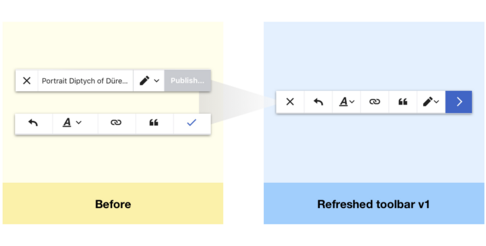
WikimaniaThe Editing Team attended Wikimania 2019 in Sweden. They led a session on the mobile visual editor and a session on the new talk pages project. They tested two new features in the mobile visual editor with contributors. You can read more about what the team did and learned in the team's report on Wikimania 2019. Looking ahead
– PPelberg (WMF) (talk) & Whatamidoing (WMF) (talk) 16:51, 17 October 2019 (UTC) ArbCom 2019 election voter messageBooks & Bytes – Issue 36Books & Bytes
Sent by MediaWiki message delivery on behalf of The Wikipedia Library team --MediaWiki message delivery (talk) 05:20, 21 November 2019 (UTC) The file File:Hershey Road Section.PNG has been proposed for deletion because of the following concern:
While all constructive contributions to Wikipedia are appreciated, pages may be deleted for any of several reasons. You may prevent the proposed deletion by removing the Please consider addressing the issues raised. Removing This bot DID NOT nominate any file(s) for deletion; please refer to the page history of each individual file for details. Thanks, FastilyBot (talk) 01:02, 22 December 2019 (UTC) Nomination of List of Dune Houses for deletionA discussion is taking place as to whether the article List of Dune Houses is suitable for inclusion in Wikipedia according to Wikipedia's policies and guidelines or whether it should be deleted. The article will be discussed at Wikipedia:Articles for deletion/List of Dune Houses until a consensus is reached, and anyone, including you, is welcome to contribute to the discussion. The nomination will explain the policies and guidelines which are of concern. The discussion focuses on high-quality evidence and our policies and guidelines. Users may edit the article during the discussion, including to improve the article to address concerns raised in the discussion. However, do not remove the article-for-deletion notice from the top of the article. Sandstein 20:58, 6 January 2020 (UTC) Books & Bytes – Issue 37Books & Bytes
On behalf of The Wikipedia Library team --MediaWiki message delivery (talk) 07:10, 1 February 2020 (UTC) Disambiguation link notification for April 8Hi. Thank you for your recent edits. An automated process has detected that when you recently edited Pretzel Amusement Ride Company, you added a link pointing to the disambiguation page Bay Shore Park (check to confirm | fix with Dab solver). Such links are usually incorrect, since a disambiguation page is merely a list of unrelated topics with similar titles. (Read the FAQ • Join us at the DPL WikiProject.) It's OK to remove this message. Also, to stop receiving these messages, follow these opt-out instructions. Thanks, DPL bot (talk) 09:48, 8 April 2020 (UTC) Editing news 2020 #1 – Discussion toolsRead this in another language • Subscription list 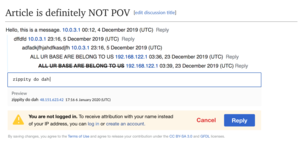 The Editing team has been working on the talk pages project. The goal of the talk pages project is to help contributors communicate on wiki more easily. This project is the result of the Talk pages consultation 2019.  The team is building a new tool for replying to comments now. This early version can sign and indent comments automatically. Please test the new Reply tool.
To hear more about Editing Team updates, please add your name to the "Get involved" section of the project page. You can also watch – PPelberg (WMF) (talk) & Whatamidoing (WMF) (talk) 15:45, 13 April 2020 (UTC) The file File:PlatycratFlag.PNG has been proposed for deletion because of the following concern:
While all constructive contributions to Wikipedia are appreciated, pages may be deleted for any of several reasons. You may prevent the proposed deletion by removing the Please consider addressing the issues raised. Removing This bot DID NOT nominate any file(s) for deletion; please refer to the page history of each individual file for details. Thanks, FastilyBot (talk) 01:02, 15 April 2020 (UTC) Issue 38, January – April 2020Books & Bytes
On behalf of The Wikipedia Library team --15:57, 29 April 2020 (UTC) Books & Bytes – Issue 39, May – June 2020Books & Bytes
On behalf of The Wikipedia Library team --MediaWiki message delivery (talk) 06:13, 11 June 2020 (UTC) Editing news 2020 #2 – Quick updatesRead this in another language • Subscription list 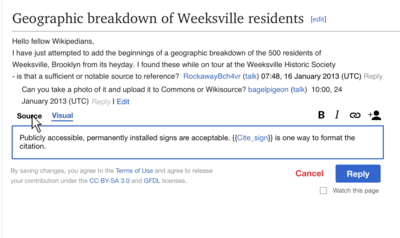 This edition of the Editing newsletter includes information the Wikipedia:Talk pages project, an effort to help contributors communicate on wiki more easily. The central project page is on MediaWiki.org.
– Whatamidoing (WMF) (talk) 18:11, 15 June 2020 (UTC) Editing news 2020 #3 Seven years ago this week, the Editing team made the visual editor available by default to all logged-in editors using the desktop site at the English Wikipedia. Here's what happened since its introduction:
Whatamidoing (WMF) (talk) 02:05, 3 July 2020 (UTC) Editing news 2020 #4Read this in another language • Subscription list for this newsletter Reply tool The Reply tool has been available as a Beta Feature at the Arabic, Dutch, French and Hungarian Wikipedias since 31 March 2020. The first analysis showed positive results.
The Editing team released the Reply tool as a Beta Feature at eight other Wikipedias in early August. Those Wikipedias are in the Chinese, Czech, Georgian, Serbian, Sorani Kurdish, Swedish, Catalan, and Korean languages. If you would like to use the Reply tool at your wiki, please tell User talk:Whatamidoing (WMF). The Reply tool is still in active development. Per request from the Dutch Wikipedia and other editors, you will be able to customize the edit summary. (The default edit summary is "Reply".) A "ping" feature is available in the Reply tool's visual editing mode. This feature searches for usernames. Per request from the Arabic Wikipedia, each wiki will be able to set its own preferred symbol for pinging editors. Per request from editors at the Japanese and Hungarian Wikipedias, each wiki can define a preferred signature prefix in the page MediaWiki:Discussiontools-signature-prefix. For example, some languages omit spaces before signatures. Other communities want to add a dash or a non-breaking space. New requirements for user signatures
Next: New discussion toolNext, the team will be working on a tool for quickly and easily starting a new discussion section to a talk page. To follow the development of this new tool, please put the New Discussion Tool project page on your watchlist. Whatamidoing (WMF) (talk) 18:48, 31 August 2020 (UTC) Books & Bytes – Issue 40Books & Bytes
Sent by MediaWiki message delivery on behalf of The Wikipedia Library team --10:14, 10 September 2020 (UTC) Books & Bytes – Issue 41Books & Bytes
Sent by MediaWiki message delivery on behalf of The Wikipedia Library team --10:47, 18 November 2020 (UTC) ArbCom 2020 Elections voter messageEditing news 2021 #1Read this in another language • Subscription list for this newsletter Reply tool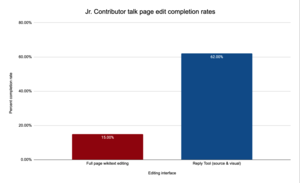 The Reply tool is available at most other Wikipedias.
Research notes:
New discussion tool The new tool for starting new discussions (new sections) will join the Discussion tools in Special:Preferences#mw-prefsection-betafeatures at the end of January. You can try the tool for yourself.[23] You can leave feedback in this thread or on the talk page. Next: Notifications During Talk pages consultation 2019, editors said that it should be easier to know about new activity in conversations they are interested in. The Notifications project is just beginning. What would help you become aware of new comments? What's working with the current system? Which pages at your wiki should the team look at? Please post your advice at mw:Talk:Talk pages project/Notifications. –Whatamidoing (WMF) (talk) 01:02, 23 January 2021 (UTC) Books & Bytes - Issue 42Books & Bytes
Sent by MediaWiki message delivery on behalf of The Wikipedia Library team --14:00, 25 January 2021 (UTC) Good article drive notice
-- For the drive co-ordinators, MediaWiki message delivery (talk) 15:27, 21 February 2021 (UTC) Books & Bytes – Issue 42Books & Bytes
Sent by MediaWiki message delivery on behalf of The Wikipedia Library team --11:27, 22 March 2021 (UTC) Books & Bytes – Issue 43Books & Bytes
Sent by MediaWiki message delivery on behalf of The Wikipedia Library team --11:11, 10 May 2021 (UTC) Editing news 2021 #2Read this in another language • Subscription list for this newsletter  Earlier this year, the Editing team ran a large study of the Reply Tool. The main goal was to find out whether the Reply Tool helped newer editors communicate on wiki. The second goal was to see whether the comments that newer editors made using the tool needed to be reverted more frequently than comments newer editors made with the existing wikitext page editor. The key results were:
These results give the Editing team confidence that the tool is helpful. Looking ahead The team is planning to make the Reply tool available to everyone as an opt-out preference in the coming months. This has already happened at the Arabic, Czech, and Hungarian Wikipedias. The next step is to resolve a technical challenge. Then, they will deploy the Reply tool first to the Wikipedias that participated in the study. After that, they will deploy it, in stages, to the other Wikipedias and all WMF-hosted wikis. You can turn on "Discussion Tools" in Beta Features now. After you get the Reply tool, you can change your preferences at any time in Special:Preferences#mw-prefsection-editing-discussion. 00:27, 16 June 2021 (UTC) Books & Bytes – Issue 45Books & Bytes
Sent by MediaWiki message delivery on behalf of The Wikipedia Library team --11:04, 30 July 2021 (UTC) Books & Bytes – Issue 46Books & Bytes
Sent by MediaWiki message delivery on behalf of The Wikipedia Library team --11:14, 22 September 2021 (UTC) Books & Bytes – Issue 47Books & Bytes
Sent by MediaWiki message delivery on behalf of The Wikipedia Library team --16:58, 10 November 2021 (UTC) ArbCom 2021 Elections voter messageDiscussion notice: WP Amusement ParksPlease see the discussion at WT:WikiProject Amusement Parks#Status field for Amusement Park infoboxes. Thanks. --GoneIn60 (talk) 16:09, 18 January 2022 (UTC) Books & Bytes – Issue 48Books & Bytes
Sent by MediaWiki message delivery on behalf of The Wikipedia Library team --15:12, 2 February 2022 (UTC) Books & Bytes – Issue 49Books & Bytes
Sent by MediaWiki message delivery on behalf of The Wikipedia Library team --10:06, 25 March 2022 (UTC) Editing newsletter 2022 – #1Read this in another language • Subscription list for the multilingual newsletter • Local subscription list  The New topic tool helps editors create new ==Sections== on discussion pages. New editors are more successful with this new tool. You can read the report. Soon, the Editing team will offer this to all editors at most WMF-hosted wikis. You can join the discussion about this tool for the English Wikipedia is at Wikipedia:Village pump (proposals)#Enabling the New Topic Tool by default. You will be able to turn it off in the tool or at Special:Preferences#mw-prefsection-editing-discussion. The Editing team plans to change the appearance of talk pages. These are separate from the changes made by the mw:Desktop improvements project and will appear in both Vector 2010 and Vector 2022. The goal is to add some information and make discussions look visibly different from encyclopedia articles. You can see some ideas at Wikipedia talk:Talk pages project#Prototype Ready for Feedback. 23:14, 30 May 2022 (UTC) Books & Bytes – Issue 50Books & Bytes
Sent by MediaWiki message delivery on behalf of The Wikipedia Library team --12:52, 1 June 2022 (UTC) (UTC) Books & Bytes – Issue 51Books & Bytes
Sent by MediaWiki message delivery on behalf of The Wikipedia Library team --16:45, 1 August 2022 (UTC) Editing news 2022 #2Read this in another language • Subscription list for this multilingual newsletter  The new [subscribe] button notifies people when someone replies to their comments. It helps newcomers get answers to their questions. People reply sooner. You can read the report. The Editing team is turning this tool on for everyone. You will be able to turn it off in your preferences. –Whatamidoing (WMF) (talk) 00:35, 26 August 2022 (UTC) Nomination of Toboggan (Hersheypark) for deletionA discussion is taking place as to whether the article Toboggan (Hersheypark), to which you have significantly contributed, is suitable for inclusion in Wikipedia according to Wikipedia's policies and guidelines or if it should be deleted. The discussion will take place at Wikipedia:Articles for deletion/Toboggan (Hersheypark) until a consensus is reached, and anyone, including you, is welcome to contribute to the discussion. Users may edit the article during the discussion, including to improve the article to address concerns raised in the discussion. However, do not remove the article-for-deletion notice from the top of the article. To customise your preferences for automated AfD notifications for articles to which you've significantly contributed (or to opt-out entirely), please visit the configuration page. Delivered by SDZeroBot (talk) 01:02, 3 September 2022 (UTC) WikiProject Amusement Parks discussion Hello Hmich176! Your input is requested for a proposal at Wikipedia talk:WikiProject Amusement Parks#Draft proposal for the future of WP:APARKS. Any feedback is welcome. Thank you. Adog (Talk・Cont) 02:09, 8 September 2022 (UTC) Books & Bytes – Issue 52Books & Bytes
Sent by MediaWiki message delivery on behalf of The Wikipedia Library team --12:20, 30 September 2022 (UTC) Books & Bytes – Issue 53The Wikipedia Library: Books & Bytes
Sent by MediaWiki message delivery on behalf of The Wikipedia Library team --11:19, 17 November 2022 (UTC) ArbCom 2022 Elections voter messageHello! Voting in the 2022 Arbitration Committee elections is now open until 23:59 (UTC) on Monday, 12 December 2022. All eligible users are allowed to vote. Users with alternate accounts may only vote once. The Arbitration Committee is the panel of editors responsible for conducting the Wikipedia arbitration process. It has the authority to impose binding solutions to disputes between editors, primarily for serious conduct disputes the community has been unable to resolve. This includes the authority to impose site bans, topic bans, editing restrictions, and other measures needed to maintain our editing environment. The arbitration policy describes the Committee's roles and responsibilities in greater detail. If you wish to participate in the 2022 election, please review the candidates and submit your choices on the voting page. If you no longer wish to receive these messages, you may add WikiProject Amusement Parks reliable source discussion Hi, Hmich176. Your input is requested at WikiProject Amusement Parks, as there is a discussion about the reliability of some sources which can be found at Wikipedia talk:WikiProject Amusement Parks#Reliable source discussion. Thank you!
Harobouri T • C (he/him) 16:49, 3 December 2022 (UTC) Books & Bytes – Issue 54The Wikipedia Library: Books & Bytes
Sent by MediaWiki message delivery on behalf of The Wikipedia Library team --14:14, 23 January 2023 (UTC) Editing news 2023 #1Read this in another language • Subscription list for this newsletter This newsletter includes two key updates about the Editing team's work:
Talk pages project  The Editing team is nearly finished with this first phase of the Talk pages project. Nearly all new features are available now in the Beta Feature for Discussion tools. It will show information about how active a discussion is, such as the date of the most recent comment. There will soon be a new "Add topic" button. You will be able to turn them off at Special:Preferences#mw-prefsection-editing-discussion. Please tell them what you think.  An A/B test for Discussion tools on the mobile site has finished. Editors were more successful with Discussion tools. The Editing team is enabling these features for all editors on the mobile site. New Project: Edit Check The Editing team is beginning a project to help new editors of Wikipedia. It will help people identify some problems before they click "Publish changes". The first tool will encourage people to add references when they add new content. Please watch that page for more information. You can join a conference call on 3 March 2023 to learn more. –Whatamidoing (WMF) (talk) 18:19, 22 February 2023 (UTC) Books & Bytes – Issue 55The Wikipedia Library: Books & Bytes
Sent by MediaWiki message delivery on behalf of The Wikipedia Library team --12:45, 16 March 2023 (UTC) Books & Bytes – Issue 56The Wikipedia Library: Books & Bytes
Sent by MediaWiki message delivery on behalf of The Wikipedia Library team --10:03, 24 May 2023 (UTC) Books & Bytes – Issue 57The Wikipedia Library: Books & Bytes
Sent by MediaWiki message delivery on behalf of The Wikipedia Library team --11:22, 18 July 2023 (UTC) Books & Bytes – Issue 58The Wikipedia Library: Books & Bytes
Sent by MediaWiki message delivery on behalf of The Wikipedia Library team --14:27, 12 September 2023 (UTC) CfD nomination at Wikipedia:Categories for discussion/Log/2023 October 1 § Category:WikiProject X membersA category or categories you have created have been nominated for possible deletion, merging, or renaming. A discussion is taking place to decide whether this proposal complies with the categorization guidelines. If you would like to participate in the discussion, you are invited to add your comments at Wikipedia:Categories for discussion/Log/2023 October 1 § Category:WikiProject X members on the categories for discussion page. Thank you. Qwerfjkltalk 09:31, 2 October 2023 (UTC) Books & Bytes – Issue 59The Wikipedia Library: Books & Bytes
Sent by MediaWiki message delivery on behalf of The Wikipedia Library team --16:15, 27 November 2023 (UTC) ArbCom 2023 Elections voter messageHello! Voting in the 2023 Arbitration Committee elections is now open until 23:59 (UTC) on Monday, 11 December 2023. All eligible users are allowed to vote. Users with alternate accounts may only vote once. The Arbitration Committee is the panel of editors responsible for conducting the Wikipedia arbitration process. It has the authority to impose binding solutions to disputes between editors, primarily for serious conduct disputes the community has been unable to resolve. This includes the authority to impose site bans, topic bans, editing restrictions, and other measures needed to maintain our editing environment. The arbitration policy describes the Committee's roles and responsibilities in greater detail. If you wish to participate in the 2023 election, please review the candidates and submit your choices on the voting page. If you no longer wish to receive these messages, you may add Books & Bytes – Issue 60The Wikipedia Library: Books & Bytes
Sent by MediaWiki message delivery on behalf of The Wikipedia Library team --13:36, 24 January 2024 (UTC) Books & Bytes – Issue 61The Wikipedia Library: Books & Bytes
Sent by MediaWiki message delivery on behalf of The Wikipedia Library team --16:32, 5 March 2024 (UTC) Books & Bytes – Issue 62The Wikipedia Library: Books & Bytes
Sent by MediaWiki message delivery on behalf of The Wikipedia Library team --11:02, 23 April 2024 (UTC) Presidency Navigation Templates vs. Biography Navigation Templates discussionHello, Hmich176! Since you are listed as an active member of the United States Presidents WikiProject, would you mind leaving a comment at a project talk page discussion about a series of templates that I created for the presidencies of Lyndon B. Johnson, Richard Nixon, Gerald Ford, Jimmy Carter, Ronald Reagan, George H. W. Bush, and George W. Bush? Another editor and myself disagree about whether there should be a separate navigation template for each Presidency apart from the biographical navigation template. Thanks! -- CommonKnowledgeCreator (talk) 21:50, 9 July 2024 (UTC) Books & Bytes – Issue 63The Wikipedia Library: Books & Bytes
Sent by MediaWiki message delivery on behalf of The Wikipedia Library team --12:15, 18 July 2024 (UTC) Removing redirects (re-creating pages)There is an ongoing discussion taking place at the following articles, regarding whether the current redirects should be removed, which may be of interest to this user:
Please see the necessary talk pages for more information. Regards, Roads4117 (talk) 14:00, 15 August 2024 (UTC)
Books & Bytes – Issue 64The Wikipedia Library: Books & Bytes
Sent by MediaWiki message delivery on behalf of The Wikipedia Library team --16:33, 11 September 2024 (UTC) Books & Bytes – Issue 65The Wikipedia Library: Books & Bytes
Sent by MediaWiki message delivery on behalf of The Wikipedia Library team --12:49, 12 November 2024 (UTC) ArbCom 2024 Elections voter messageHello! Voting in the 2024 Arbitration Committee elections is now open until 23:59 (UTC) on Monday, 2 December 2024. All eligible users are allowed to vote. Users with alternate accounts may only vote once. The Arbitration Committee is the panel of editors responsible for conducting the Wikipedia arbitration process. It has the authority to impose binding solutions to disputes between editors, primarily for serious conduct disputes the community has been unable to resolve. This includes the authority to impose site bans, topic bans, editing restrictions, and other measures needed to maintain our editing environment. The arbitration policy describes the Committee's roles and responsibilities in greater detail. If you wish to participate in the 2024 election, please review the candidates and submit your choices on the voting page. If you no longer wish to receive these messages, you may add Books & Bytes – Issue 66The Wikipedia Library: Books & Bytes
Sent by MediaWiki message delivery on behalf of The Wikipedia Library team --17:32, 10 January 2025 (UTC) |
Portal di Ensiklopedia Dunia













